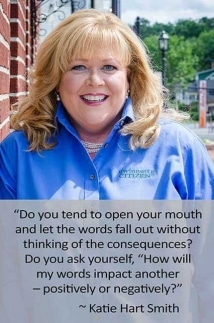
The sales clerk – we learned earlier in our conversation with her that she was from New Jersey – replied, “Oh! I just love your accent. You must be from the South. It’s so nice to hear your polite way with words.”
Afterwards, her words caused me to pause and reflect.
We live in a country that honors the freedom of speech. Do we not owe it to ourselves to use our words responsibly, respectfully, and carefully?
How we communicate with each other is learned and role modeled – it begins at home.
When one is brought up to learn that should everything get stripped away at the end of the day, all you have is your name, faith, and reputation. What are you going to be in this world? How do you represent yourself – your best self?
Simply put, your words and actions define your reputation. How do you want to be remembered – foul words + foul actions or kind words + kind actions?
Words and actions are so important; we are going to have to give an account of what we have said and done in this lifetime when we stand before God. Jesus said, “But I tell you that men will have to give account on the day of judgment for every careless word they have spoken. For by your words you will be acquitted, and by your words, you will be condemned” (Matthew 12:36–37).
In the current climate of “fake news” and misinformation, words are purposely careless, mismanaged, carefully crafted to mislead, and thrown into a jumbled word salad, mixed and tossed for freshness. The result creates undue drama, conflict, and spurs rage and anger to fuel the ratings fire. It’s time to extinguish that fire.
Can you imagine if you ran your life or business’ strategic plans on fake facts and misinformation? What would the end result be for you – personally or professionally?
Strive to be honest, forthright, and to have integrity to do the right thing, even when no one is watching. That’s how you build a reputation of trust. I believe each one of us has a responsibility to be truthful and the ability to choose our words with love.
Do you tend to open your mouth and let the words fall out without thinking of the consequences? Do you ask yourself, “How will my words impact another – positively or negatively?” By practicing empathy – by putting yourself in someone else’s shoes – ask, “How would I respond if I heard those words spoken to me?”
The value of words, emotions, and interpersonal relationships are being lost on today’s youth – unless it’s being taught at home. Social media devices replace the written word (LOL!). Abbreviations, emojis, swipes right or left, or a quick tap to give a thumbs up – such responses create an environment that devalues the written and spoken word, emotions become non-essential.
Sound familiar?
While building interpersonal relationships learn to create opportunities to listen without interruption rather than just listening to respond, meaning you aren’t taking the time to hear the other person’s intended message, but instead are formulating a response in your mind while the other person is talking. When someone else speaks, allow their words to be heard and understood. Pause before responding. Clarify if needed. If you are not on the same page about a topic, agree to disagree with courtesy and tact.
In Emily Post’s, Etiquette, originally published in 1922, she outlines the proper etiquette for a myriad of topics – how to properly converse at every social occasion, welcome newcomers in the community, write and address letters, set the table, and how to teach young children about the rules of social engagement through their interactions with each other.
Yes, this book is priceless and etiquette is becoming a lost art. Post writes, “Good taste or bad is revealed in everything we are, do, or have. Our speech, manners, dress and household furnishings – and even our friends – are evidence of the proprietary of our taste…The truly considerate person has many qualities – tact, graciousness, charm, hospitality, kindness – that are apparent in every detail of his life.”
Be an example of good behavior – speak kindly of yourself and others.
Let’s take the opportunity to skill-build the younger generation, remembering – it begins at home and by the example of those of us in our culturally diverse community when we interact with each other in public. Don’t tolerate the exhibition of bad behavior. If ignored and unaddressed, it becomes acceptable.
Take these words off the bookshelf, dust them off, and begin using them again – “Please”, “Thank you”, “I’m sorry”, “Excuse me”, “Pardon me”, “No, sir”, and “Yes, ma’am”. Kind words and good manners will always take you far – personally and professionally.
Be a reflection of your good words and deeds.
“Before you speak, let your words pass through three gates:
At the first gate, ask yourself, ‘Is it true?’
At the second gate, ask, ‘Is it necessary?’
At the third gate, ask, ‘Is it kind?’”
~ Rumi
About Katie Hart Smith
“Words, written or spoken, have power.” Katie Hart Smith’s column, “From the Heart,” touches the heart, inspires, entertains, and speaks to one’s heart and soul. With over 20 years of experience, Smith has written for a wide array of audiences. Her latest historical fiction novel, Aspirations of the Heart, has been placed in the Governor’s Mansion Library by Georgia’s First Lady, Mrs. Sandra Deal. To learn more about this Southern author, visit www.katiehartsmith.com.


